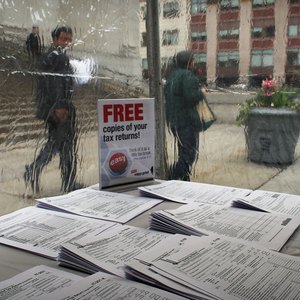
Getting a bonus is always welcome, but you’ll still owe federal taxes on the amount. Some states, such as Massachusetts, will also impose a tax on bonuses. If you expect to receive a bonus, knowing the percentage taxed ahead of time can help prepare you for any disappointment when you read the actual amount on your check. It might help to keep in mind that a bonus is a windfall, but taxes are a necessity of life. With this information, you can ensure that you are ready to pay any and all Massachusetts bonus tax requirements.
Tips
In Massachusetts, bonuses will fall under the category of "taxable wages". This specific income category, which also includes tips, commissions and fees, is taxed at a fixed rate each year.
Finding Your Taxable Income
Under the state’s payment of wages law, non-discretionary bonuses are considered wages. Non-discretionary bonuses are those in which your employer has set specific criteria for a bonus and you have earned it, opposed to a discretionary bonus which given is at the employer’s discretion. While there is no difference between the two when it comes to taxes, there is a difference if your employer does not follow Massachusetts’ payment of wages law. If the employer does not pay, the law provides for triple damages of the amount owed, including non-discretionary bonuses, and any attorney fees should an employee file suit and win. However, you’ll have to pay ordinary income tax on this tripled amount.
Looking For Your Tax Rate
In Massachusetts, bonuses fall under the category of “taxable wages,” which include tips, commissions and fees as well as wages and salaries. For 2017, your bonus will be taxed at the Massachusetts bonus tax rate of 5.1 percent. While that doesn’t sound like much, remember it is just the state bonus tax. At the federal level for 2017, you’ll owe 25 percent on your bonus, unless it exceeds one million dollars. The amount over one million is taxed at 39.6 percent. Since relatively few people receive million-dollar plus bonuses, the average Massachusetts resident receiving a bonus will pay a combined federal and Massachusetts state tax rate of 30.1 percent on the money,. In addition to any Massachusetts supplemental tax rates, your bonus is also subject to Social Security and Medicare taxes.
Obtaining Your Tax Information
For example, if your bonus were $1,000, the combined federal and state tax brings the number down to $699, but you would receive even less than that taking account for Social Security and Medicare taxes. Social Security taxes for 2017 are 6.2 percent on up to $127,200 in income, while Medicare is 1.45 percent on all income. If you earn less than $127,200, your total tax on that Massachusetts bonus is 37.75 percent, so the take-home amount for that $1,000 bonus is $622.50.
If your bonus is large, that’s not necessarily good news if it propels you into a higher tax bracket and you end up owing the IRS come April 15. You may also experience problems if your employer chooses the aggregate method of paying bonuses, which is to combine the bonus payment with your regular paycheck rather than issuing a separate bonus check. If your employer chooses the aggregate method and you are in the 28 percent federal tax bracket, you will have to wait until after filing your income taxes to receive a refund for that extra 3 percent of bonus tax. If possible, ask your employer to issue a separate bonus check for you using the percentage method.
Reporting Your Taxes
You will use IRS Form 1099-MISC in order to report any bonus you have received to the federal government. Your standard Massachusetts income tax form will be used to file all information related to your Massachusetts bonus tax.
References
- Mass.gov: Withholding Taxes on Wages
- ADP: 2017 Fast Wage and Tax Facts
- Society for Human Resource Management:2017 Payroll Taxes Will Hit Higher Incomes
- HR Knowledge: Are you Compliant with Massachusetts Pay Frequency Requirements?
- IRS. "Publication 15 (2020), (Circular E), Employer's Tax Guide." Accessed Nov. 5, 2020.
Writer Bio
A graduate of New York University, Jane Meggitt's work has appeared in dozens of publications, including Sapling, Zack's, Financial Advisor, nj.com, LegalZoom and The Nest.

